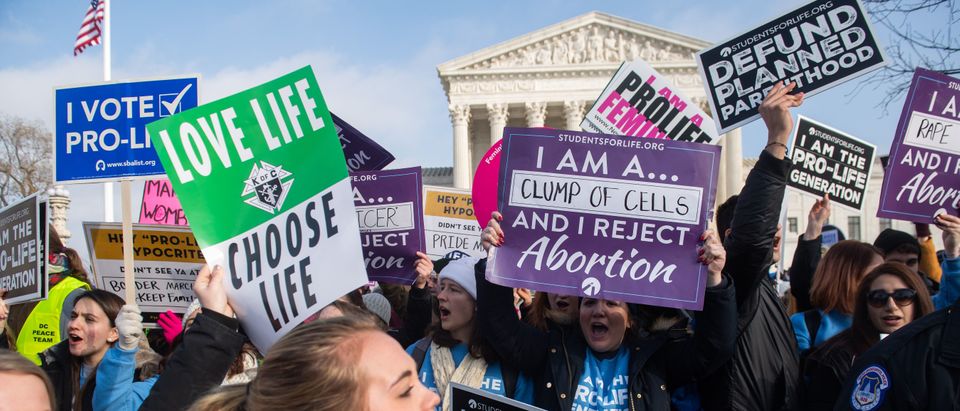The Supreme Court announced Friday that it wil
Post# of 65629

< >

The case involves a Louisiana law called the Unsafe Abortion Protection Act, which requires that abortion doctors have admitting privileges at a hospital within 30 miles of their place of practice.
The high court previously barred enforcement of the law on a 5-4 vote in February.
The Supreme Court announced Friday that it will hear its first abortion case since Justice Anthony Kennedy retired in 2018, prompting what could be the beginning of a long campaign to erode abortion access in the United States.
The case is seen as a meaningful signal as to how the Court’s conservative majority will approach abortion cases in the near term, given its similarity to a 2016 decision involving similar facts and principles.
At issue in Friday’s case is a Louisiana law called the Unsafe Abortion Protection Act or Act 620. The measures requires that physicians who perform abortions have admitting privileges at a nearby hospital. Pro-choice litigators say the law is identical to a Texas regulation the Supreme Court struck down in a 2016 case called Whole Women’s Health v. Hellerstedt.
Opponents of Act 620 say it is little more than a stealth measure to end abortion. They fear physicians will have difficulty obtaining admitting privilege despite good faith efforts to comply with the state’s regulation, meaning qualified doctors might have to close their practices without good reason. They further say the admitting privileges requirement is medically unnecessary, since few abortions require emergency surgical intervention.
After Texas implemented the regulation at issue in Whole Women’s Health, half of its 40 abortion clinics closed. Pro-choice advocates warn of a similar outcome in Louisiana, which has just three abortion providers.
Chief Justice’s role will be critical
Though U.S. District Judge John W. deGravelles blocked enforcement of the law in 2017, the 5th U.S. Circuit Court of Appeals reversed and said the law could be enforced. That prompted a last-second appeal from abortion providers to the Supreme Court.
The justices stayed the 5th Circuit’s ruling on Feb. 7 and temporarily blocked the law from taking effect on a 5-4 vote, with Chief Justice John Roberts joining the liberal bloc. The law has not been in force while the lawsuit proceeds through the courts.
As with the February decision, Roberts’s vote will likely be decisive to the outcome of the case. The meaning of the chief’s February vote is much discussed. Roberts voted with the dissenters in the Whole Women’s Health decision, which indicates he believes clinic regulations of the sort at issue here are lawful.
On the other hand, the chief is a prudent steward of the high court’s authority with a preference for normal process. As such, he may have been unwilling to undercut Whole Women’s Health in an emergency matter without the benefit of full briefing and argument.
“We are counting on the Court to follow its precedent, otherwise clinics will needlessly close and there will be just one doctor left in the entire state to provide abortion care,” said Nancy Northup of the Center for Reproductive Rights, which represents the clinics. (RELATED: It Doesn’t Look Like Brett Kavanaugh’s Confirmation Was A Drag On The Supreme Court)
Chief Justice John Roberts at the Supreme Court on November 30, 2018. (Mandel Ngan/AFP/Getty Images)
Chief Justice John Roberts at the Supreme Court on November 30, 2018. (Mandel Ngan/AFP/Getty Images)
An undue burden?
The case will turn on whether the justices find Act 620 imposes an “undue burden” on an abortion access. In Planned Parenthood v. Casey, a fractured Supreme Court held that regulations may not have the purpose or effect of imposing an undue burden on abortion access.
In Whole Women’s Health, a five-member majority led by Justice Stephen Breyer said the Texas law imposed several discreet burdens on abortion — clinic closures; inability of remaining clinics to meet demand; increased driving distances for women terminating their pregnancies.
The parties are divided over the burden Act 620 imposes. Louisiana says Act 620 is necessary to promote physician competence and bring abortion providers into compliance with preexisting regulations for ambulatory surgical centers.
“Incompetent and unsafe providers should not be allowed to challenge health and safety standards designed to protect women from those very providers,” Louisiana Attorney General Jeff Landry said in a statement following Friday’s news.
In upholding the law, the 5th Circuit questioned whether Louisiana’s abortion providers made sincere efforts to comply with Act 620. For example, the panel said one provider made no attempt to obtain admitting privileges from a qualifying hospital. Another will obtain privileges pending fulfillment of a single requirement, which the provider has not tried to complete.
To the panel’s eye, it was the provider’s insufficient attempts at compliance — and not Act 620 — that compromise access.
“There is insufficient evidence to conclude that, had the doctors put forth a good-faith effort to comply with Act 620, they would have been unable to obtain privileges,” Judge Jerry Smith wrote for the majority. “Instead…the vast majority largely sat on their hands, assuming that they would not qualify. Their inaction severs the chain of causation.”
The 5th Circuit also noted that admitting privileges are comparatively more difficult to obtain in Texas, further diminishing whatever burden on access might exist.
“Almost all Texas hospitals required that for a doctor to maintain privileges there, he or she had to admit a minimum number of patients annually,” the decision reads. “Few Louisiana hospitals make that demand.”
About 10,000 abortions are performed in Louisiana per year, according to the Guttmacher Institute.
 (0)
(0) (0)
(0)